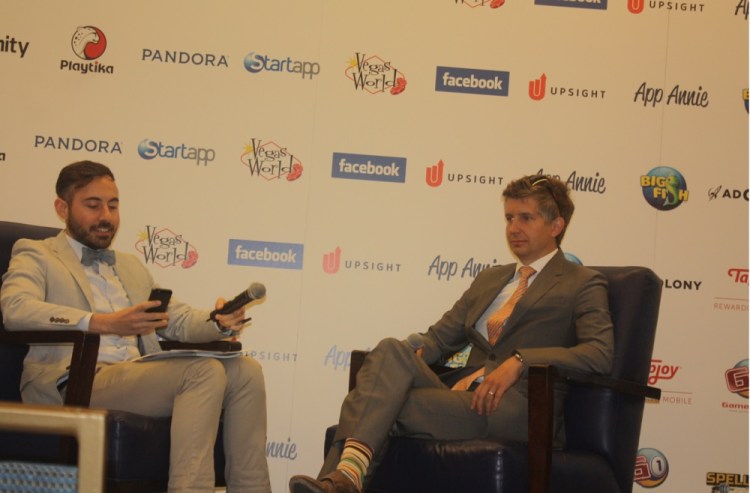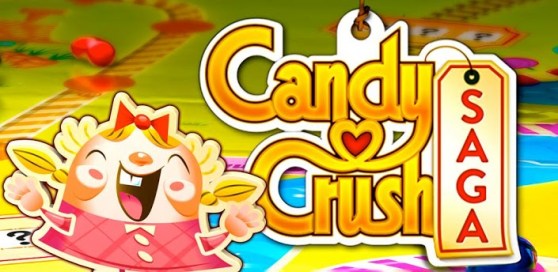Lebedev: Let’s talk about Candy Crush. When Candy Crush came out, as you said, it was a big success. Was it featured by Apple when it came out?
Palm: Not originally, to my knowledge. There are many different reasons why it didn’t get a big feature at the time. But since then, it’s gotten a lot of features. We obviously work closely with Apple and Google.
Lebedev: I don’t want to press the subject too much, because there’s a lot about why Candy Crush is successful. But I just thought it was interesting that when it came out, its success wasn’t driven by Apple immediately. I think its success was driven by a lot of other factors.
Palm: Yeah. One thing that was a huge factor was that there was already a big audience on Facebook at the time. They were actively — if you looked at the Facebook app page, you’d see that they were already asking about a mobile version of the game every day, in big numbers. When we released the mobile version there was instantly a big buzz there. People downloaded it straight away.
Lebedev: Can you talk about some of the tricks you guys use between the Facebook and mobile version? My girlfriend would always switch devices to get more lives and so on. These are all design aspects that were thought through.
Palm: It’s a combination. It’s something we talked about originally, how we wanted it. Now we see that people really do that. They run out of lives on one platform and go right over to the other platform, which isn’t bad for us at all. It’s something we encourage.
Lebedev: I noticed, when I was playing Farm Heroes Saga, there used to be a loop where you could get infinite money. I brought it up to one of your guys and he said that was a feature. I thought that was pretty cool. Let’s talk more about some controversial things. Why isn’t Candy Crush a copy of Bejeweled? Because you get a lot of negative press about that. I don’t think it is. I think it’s two separate games.
Palm: I especially see that a lot from the hardcore community, the forums people. One thing that they’re not looking at, perhaps, is that match-three games is really the genre. We’ve made several match-three games with Candy Crush already. There were also many match-three games before Bejeweled. But these games definitely look at each other and see what’s been done well and try to add new elements to it. With Candy Crush, there’s the fact that you can combine power-up candies together, which is something new.
Lebedev: Is there a bit of a fear of change? My philosophy is that there’s never really cloning. It’s all just iterations. Maybe you can talk about your own opinion in that area. Some of the Fabrication games, they were simple games. It’s not like you copied a solitaire game.
Palm: The game development community thrives quite a lot when it’s not so much about patents on games. You can look at concepts and try to improve them if it’s something worthwhile for players to play and spend their time on.
Lebedev: You said the word “patent.” Why did King cause itself all these troubles with these public copyrights on common words?
Palm: I’m not an expert in that field at all. But there’s a great letter from our CEO on the website talking about those issues. One thing he says is that we have a policy of protect and respect. We’ve seen a lot of identical games, basically, that are trying to mimic a famous brand of ours and pull people in. We’ve been trying to stop that, and one efficient way of doing so is by having a trademark.
Lebedev: So it’s not that you hate independent developers. There are just SEO tricks. If I call a game something close to Candy Crush Saga, everyone will come to me.
Palm: We’ve seen quite a lot of that. There was an article in Business Insider that had a long list of games that were aiming to trick people who are unfamiliar with our games.
Lebedev: Do you think that independent games and companies matter in a concurrent ecosystem?
Palm: Yeah. We had this period in the console and PC space where people complained a lot that there was no innovation. Everything had stagnated a little bit because nobody wanted to take any risks. That’s something indies always do. I love to go to the indie showcases and look at the game concepts they come up with. A lot of innovations come from those types of games. I love a thriving indie community. In Sweden, we have a really strong indie scene. King takes every opportunity we can to try to sponsor events.
Lebedev: After the IPO, would you say King has turned evil?
Palm: Ah, no. Well, it’s obviously — King is not a person. It’s a big company. Many people, especially if you follow the forums, you can get that feeling, though.
Lebedev: I mean, I think King is a nice company. I like your games. But I don’t know what you have against raccoons. The villain in Farm Hero — you guys just hate raccoons, or what?
Palm: No, no. We like raccoons. But they make for an excellent villain.
Lebedev: I wanted to ask more about working at King. You guys have, what, 100 trillion offices?
Palm: More like 11.
Lebedev: You mentioned the agile process and wanted to talk more about that. I’ve never heard anyone at King talk about what happens inside. Could you talk more about the office culture, maybe, in Sweden and other places?
Palm: Sweden is where I’m most familiar with the culture. We typically use scrum, two-week sprints. People come together and talk as a team about what they’re going to do. We release new updates and content for games every second week. Typically a new episode with 50 new levels. We also take a look at old levels, when we see that people get stuck there a lot.
Lebedev: What language do people speak there?
Palm: Typically English.
Lebedev: So everyone is — because you guys have a Spanish office, a German office, but it’s usually English?
Palm: We also recruit a lot of non-Swedes into the Swedish office. That’s one great thing about Stockholm, for instance. It’s a good place to live, so people don’t mind relocating. It’s very hard to find somewhere nicer to live.



